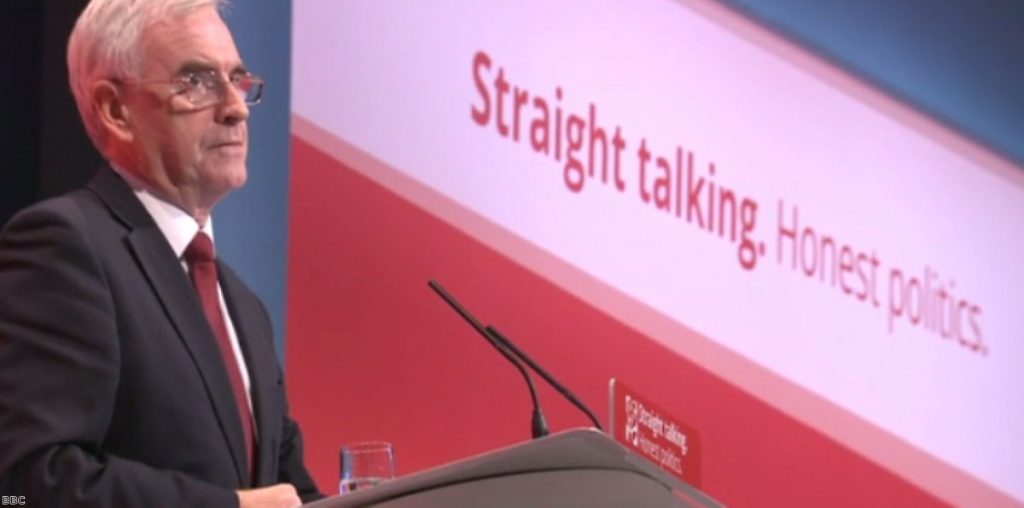Labour can win as an anti-austerity party. They can’t win as a shambles
It's important to say from the outset that George Osborne's fiscal charter, which compels the government to keep a budget surplus, is an economic and political nonsense. When Alistair Darling proposed a similar idea under the "Fiscal Responsibility Act", it was rightly laughed out of court by Osborne as "vacuous and irrelevant". As many pointed out at the time, no government can bind it's successor, so Darling was essentially legislating in order to compel himself to do what he would have done anyway.
That Osborne is repeating this folly is bad enough, but his inclusion of the proviso that a budget surplus must be kept only in "normal times" makes the whole charter doubly irrelevant. It means in effect that Osborne will be legally compelled to keep a surplus, but only unless he decides otherwise. To say the charter isn't worth the paper it's printed on is to wrongly suggest that it has any value whatsoever. It is a joke without a punchline.
As even the Taxpayers' Alliance commented when Osborne first proposed it, this is "a meaningless political gimmick of the most transparent kind". It is also the world's most obvious political trap, although to call this a trap is like calling a 20,000 ton battleship a weapon of covert warfare. Traps only work if they are at least partly hidden. Osborne's snake pit is so visible, he may as well have put up a flashing billboard outside and sold tickets.
Even the most hapless and politically naive opposition could have seen Osborne's trap and avoided it. Instead Labour today jumped into it headfirst.


So how did it ever come to this? How, when faced with the difficult choice of either backing the charter, or opposing, did McDonnell take the decision to do both? How has the shadow chancellor managed to annoy both his supporters and his opponents on the Labour benches, while leaving Labour's economic credibility in even worse shape than it was before he took the job?

Speaking on the Today programme this morning, shadow international development secretary Diane Abbott, struggled to justify the decision, while claiming that the real story was "where Osborne's mismanagement is taking the country." Now this may well be true. But when Labour's shadow economic team can't even seem to manage themselves, is it any wonder everybody is talking about that instead?
At a meeting of the parliamentary Labour party last night, the indignant shouts of Labour MPs could be heard from outside as McDonnell announced his U-Turn. Before long, Bradshaw stormed out labelling the whole thing a "fucking shambles" and giving waiting journalists exactly the headlines they'd all been waiting for.
Afterwards, the press were briefed that the decision had been taken to give Scottish Labour a better chance of fighting the SNP. Of course this makes perfect sense and indeed Nicola Sturgeon had sent out a press release in advance of the meeting challenging the party to vote against the charter.
But this was all perfectly foreseeable. If Labour had voted in favour of the charter, they would obviously have been hammered not just by the SNP but also by the Greens and other left-leaning parties. It would have been an error on the scale of Labour's previous decision to abstain on the welfare bill – a decision which arguably led to Corbyn's election in the first place. By backing the charter, Labour would have made Corbyn's election on an anti-austerity agenda look like a sham.
All of this was glaringly obvious. So why on Earth did Labour ever consider backing the charter in the first place?
Since Labour's defeat in May, many commentators have claimed that it is impossible for the party to win on an anti-austerity agenda. Personally I disagree with this. In my view it is perfectly possible for Labour to win without proposing severe cuts to public services and without backing ludicrous political gimmicks like Osborne's fiscal charter.
But in order to persuade the public of this, Labour must first convince us that they at least know what their own economic argument is, even if they can't persuade all their own MPs of it. The events of the past few weeks suggest the party still has a long way to go on both counts.

